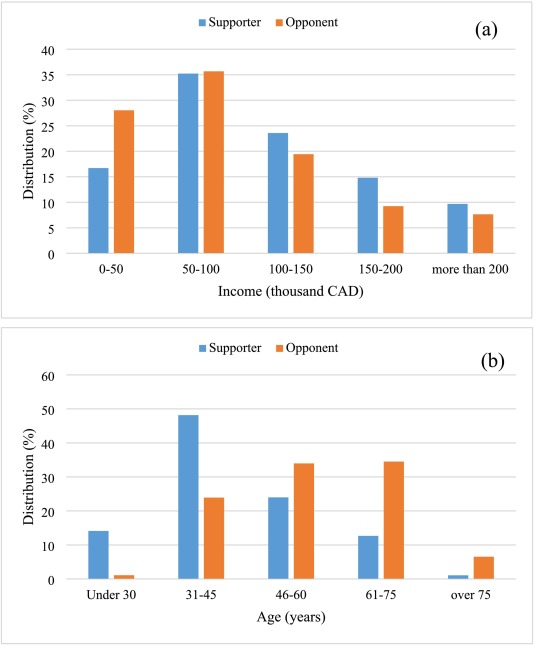What on earth is going on here? Seems like the opposite of what you’d expect?
As shown, the lowest income group (0-50 k CAD) was more likely to oppose car-free projects.

Tracks with my experience
People in north america pay top dollar to live somewhere where it is possible to live car free, partially because there are so few places. This causes only the wealthy to experience decent transit and walkability. So it makes sense that lower incomes oppose to it as they assume they’ll be walking next to a 6 lane road because they’ve never been given anything else.
They both track
Older people (often with mobility issues from a sedentary lifestyle) obviously would object to more walking. Ironically more pedestrian areas forcing them to walk more would help decrease the number of them with mobility issues.
Lower income people see the argument as a waste of time that rich people worry about. They are too pre-occupied with trying to survive. They also consider the inconvenience of longer commute times if they work in the area. The extra 15 minutes walking time for their shifts at multiple jobs is a killer.
Nah, I respectfully disagree. Here’s why
Older people (often with mobility issues from a sedentary lifestyle) obviously would object to more walking.
The biggest risk to seniors while out of their home is going to be large, fast moving vehicles (i.e. cars). Car-free projects, especially like what we’ve seen in Montreal, make their life much, much safer and far more accessible. It expands on areas where they can move, even with a mobility device, and ensures that they won’t be run over at intersections.
Lower income people see the argument as a waste of time that rich people worry about. They are too pre-occupied with trying to survive. They also consider the inconvenience of longer commute times if they work in the area. The extra 15 minutes walking time for their shifts at multiple jobs is a killer.
Car-free projects, which would include more affordable, accessible ways to travel, would benefit low-income people the most! Someone who can’t afford a car, really couldn’t care less if roads are being widened for cars. They do care that the money spent on car-infrastructure isn’t going to better public transportation, affordable shared bike/e-scooter programs, infrastructure that they can safely navigate without a car, etc.
I’m just really surprised by the data, however, I’m sure other data points (in the study) could explain these figures.
Median income for seniors is less than 50k, and higher for the other age groups (except perhaps the under 30). So the result for the lowest income group may be just further confirmation of boomers opposing car-free projects.
D’oh. I hoped they would be naming names.
Wanna bet theyre all in this comment section?


